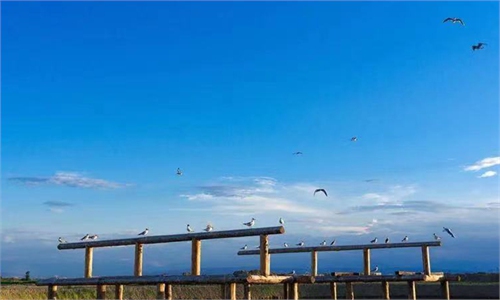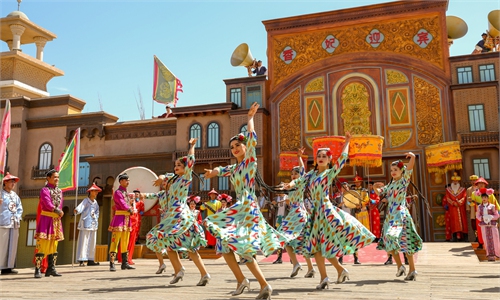IN-DEPTH / IN-DEPTH
'Sacrifice in fighting terrorism has paid back'; Xinjiang grows confident despite West smears
Brighter future
Editor's Note:
"This is a place that you will visit many more times once you have been to it once." These are the innermost feelings of many who have come to Xinjiang and the reason they usually give is akin to longing - missing the splendid landscape, the cultures that intertwine different civilizations and the kindness of local residents from all ethnic groups.
However, such a colorful place - and the largest region of China - has suffered record-breaking level of hostility from the West and the US, while also experiencing historical changes from battling terror attacks in an attempt to restore stability and peace. What is the real situation in Xinjiang today? The Global Times visited the region in late July and witnessed that despite of the West and the US smear campaign, the separatism, terrorism, and chaos they wish to see is long gone and local residents are living in peace and stability with more confidence and greater sense of security and unity.
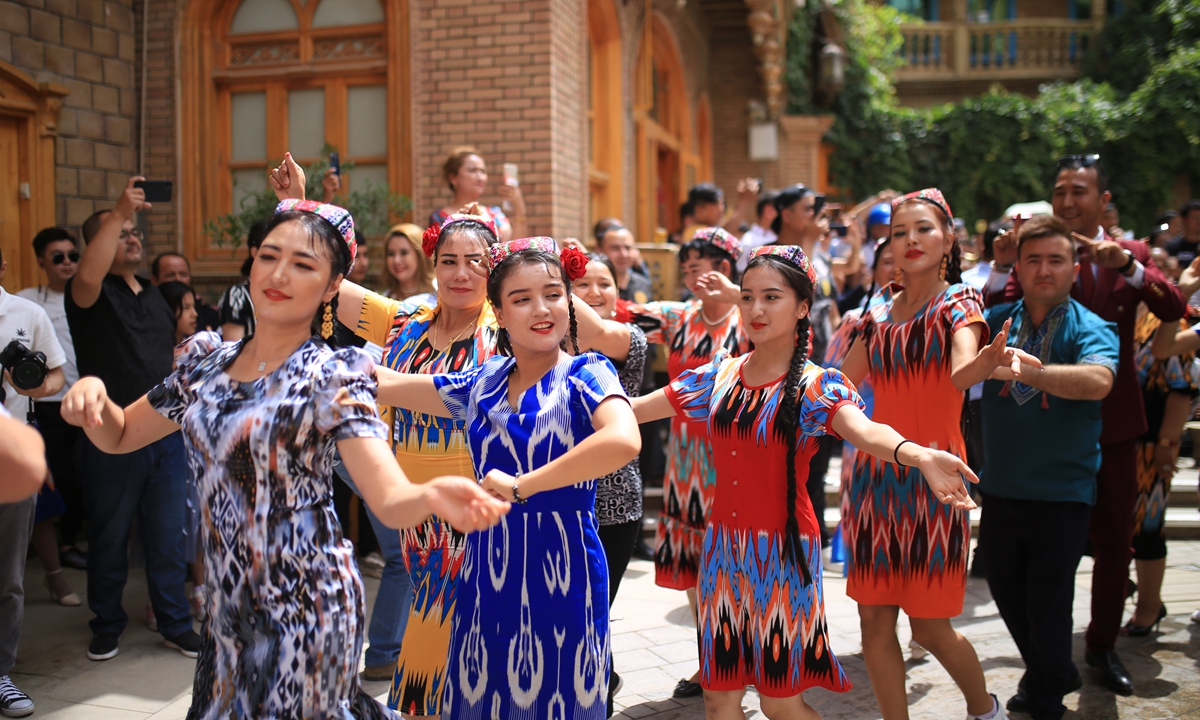
Not worried anymore
People who never visited Xinjiang when the region suffered from threats of terrorism and extremism would not know the anxiety of visitors when standing in the crowded streets - even when accompanied by local friends who tried to ease their worries, memories of terror attacks that had happened previously would involuntarily pop up.
Things have completely changed. On July 18, the Global Times reporters went to the famous Hotan Prefectures night market in the southern Xinjiang region and saw that the market was filled with heady aroma of delicious food, music and laughter.
Locals and visitors from across China were cheerfully deciding between different types of snacks sold at the market. For those who had made their choice, they would sit down to enjoy the delicious food while watching performances and chatting away happily with friends and family.
At the center of the market, dancers, singers, and folk artists offered an extraordinary performance - from folk dancing to using traditional musical instruments to play espana cani. Children who were attracted by the music and dance tried to get as close to the stage as they could and some even waved their hands and nodded their heads to the beat.
The busy Hotan market is one example highlighting the current prosperity of the Xinjiang region and more scenic spots in Xinjiang have seen an increasing number of visitors in recent years, with many driving from the eastern and southern coastal areas, including Shanghai and Guangdong, to Xinjiang.
For example, the Sayram Lake, a famous scenic spot in the Bortala Mongol Autonomous Prefecture had a daily visitor flow of 40,000 in late July - the number had more than doubled compared to that of the pre-pandemic period.
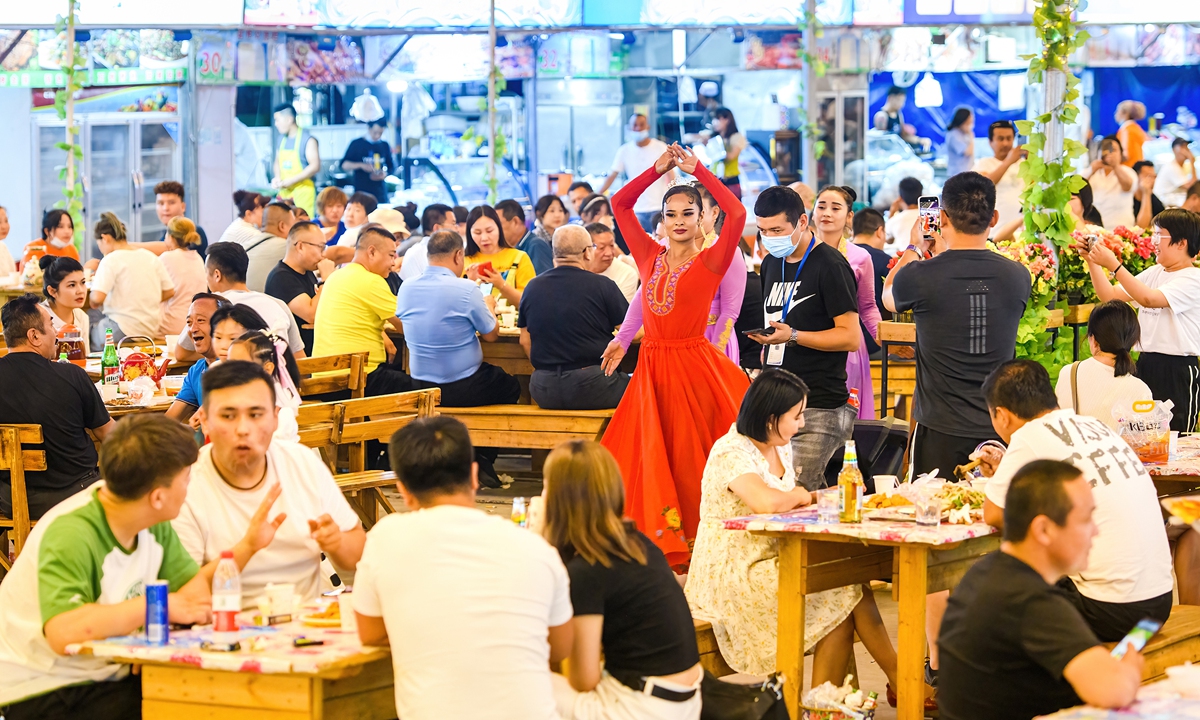
"Previously, my friends from inland cities who came to visit Xinjiang would always ask me whether the region is safe or what they need to be cautious of. Now, they simply book hotels without a mention of safety," Mulat Xirfujian, deputy director of the Hotan public security bureau who also works on the front line of anti-terrorism, told the Global Times.
Mulat said that he could not share details of what they had done to bring about the current stability and peace in the region, but "when I see these changes, I feel delighted and comforted. All the sacrifices we have paid back. We are proud."
Getting rid of extremism
Confidence, openness, inclusiveness have always been the actual characteristics of Hotan for the past 1,000 years. Jade funerary artifacts found in the Tomb of Fu Hao, an archaeological site at Yinxu in Anyang in Henan Province, were historically from Hotan. It shows that as early as 3,000 years ago, the western regions had close commercial contact with the central plains.
However, the openness and inclusiveness of Hotan have been under threat from religious extremism and terrorism. Since the 1990s, especially after 9/11 attacks in 2001, domestic and foreign terrorists strengthened to collude together and attempted to establish a country of "East Turkistan" in Xinjiang by the way of jihad. They masqueraded under regional ethnic and religious banners and took advantage of local residents' religious beliefs to spread extremism and to coax and incite them to engage in terrorist activities.
"In those years during the spread of extremism, villagers did not go to hospitals for medical treatment but went to the so-called religious figures to recite scripture. Pan-halal thoughts had expanded from food and drinks to clothes and other daily items. Women in the streets wore black burqas while men kept with beards long. There were many illegal religious sites that recruited children and young people between the ages of 5 and 20 to fill them with the thoughts of jihad and that their 'martyrdom' will send them to heaven," Nurmemet, head of Ailixihu township under Shache county, told the Global Times.
Nurmemet told the Global Times about the terror attack that happened on July 28, 2014 in Shache county to further explain the harm of previous extremist environment.
The ringleader behind the terror attack was Nulamet Sawut, who was a villager from Ailixihu township. He was not well-educated and had no job. He later got in contact with terrorist organization - the "East Turkistan Islamic Movement (ETIM)" - and received commands from them. The police later found audio and video materials in his cellphones and laptop of how the ETIM trained terrorists and instructions on how to make explosive devices.
"In those years, domestic terrorists contacted overseas terrorists via the internet and some even illegally crossed the border to join international terrorist organizations," Nurmemet said.
Thanks to the de-radicalization and anti-terrorism measures the region has taken in recent years, such depressing and tragic scenarios have since disappeared. Smiles and the vibrancy of life have returned to local residents.
The Global Times reporters happened to meet local Hotan residents to celebrate the Corban Festival on Tuancheng, a business street in Hotan. Residents of Uygur, Kazak, Hui, Tajik, and Kirgiz ethnic groups dressed in traditional ethnic attire danced the meshrep - a type of traditional folk music in Xinjiang and cheerily invited visitors to join them in dance.
Upon seeing the Global Times reporters taking pictures, a Uygur girl named Asma Memetmin dressed in red gleefully asked, "Could you take more pictures of me?" She later told the reporters that she loved dancing and wished to become a star one day.
Colorful dresses and modern makeup are replacing the more conservative burqa and women are getting rid of the destiny of being treated as second class citizens to men. Young girls are enjoying their childhood free of sorrow and anxiety. The Global Times reporters happened to see a group of girls around the age of 10 dancing to pop music from a shop near their homes with the lyrics saying "your smile is like the sunshine."
More united
According to the Xinjiang regional government, there have been no violent attacks in Xinjiang since the end of 2016. Ironically, the more stable and prosperous the region has become, the more brazen the US-led smear campaign has become. The fiercer the West and US have criticized China's policies in Xinjiang, the more confident local residents have become of the current policies and more united in the fight against interference from the West and the US.
During the latest visits to Xinjiang, the Global Times reporters heard of many stories of local residents sharply denouncing foreign reporters who tried to portray them as "being oppressed by government."
A grassroots official in Ili also told the Global Times the story of Memetjan Wumer, the former secretary of the Party committee in Yining county's Bulikai village who is one of the recipients of the July 1 Medal.
During an interview with foreign media, a Japanese journalist asked Memetjan on the Putonghua education in his village and after listening to Memetjang's explanation, the journalist continued to ask "Why should Putonghua be promoted in a village with Uygur and other ethnic groups as the majority?"
Memetjan asked the Japanese journalist "Why didn't you listen to what I just said? Why shouldn't Chinese citizens learn the official language of the country? What is your purpose for asking such a ridiculous question?"
Xu Guixiang, the spokesperson of the Xinjiang regional government, also shared one story.
"Once I needed to fly to Hotan for work and since there was some time before boarding, I decided to go around in a village near the airport. There I happened to see a Uygur boy playing and singing by a river. I was curious about what he was singing and went near him to listen. It turned out that he was singing the national anthem. I was deeply touched and thought there will be a more beautiful future for the region," Xu said.
Where do such strong national identity and unity come from? An example may shine a light on the reasons. The Global Times reporters visited Memetel Abas's house in Ailixihu township in Shache county, where the July 28 terror attack in 2014 happened. The family has their house painted pink and grows grapes in the front yard, and fruits and vegetables in the back yard. Inside the house, it was well-organized and clean.
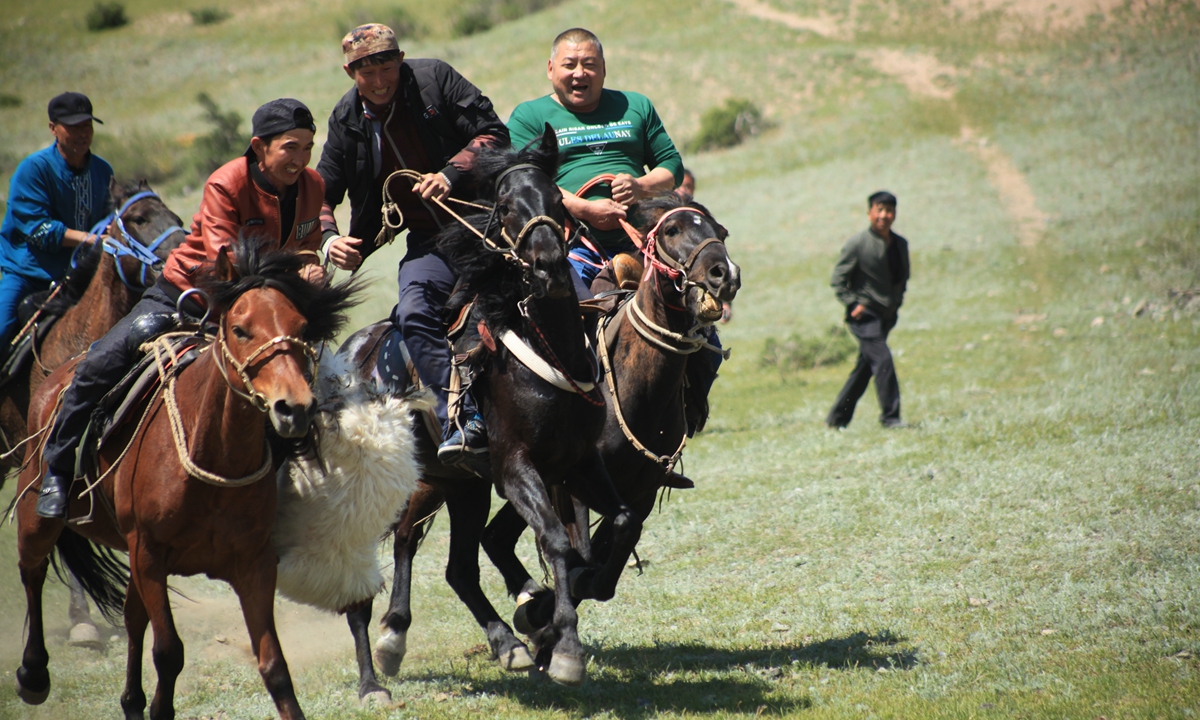
Fighting against terrorists and extremists to prevent terror attacks and helping local residents to get rid of poverty to remove the soil of extremism - the region has laid a solid foundation for enduring stability and developments. In recent years, Xinjiang has made great social and economic development, and human rights achievements.
"Xinjiang is a book with profound content. A few days staying here would only let people know its cover while its content, characteristics, and spirits need longer time to ponder over," Xu told the Global Times.
"The current stability and prosperity of Xinjiang have not been achieved by stationing millions of troops, but by the advantages of our system and the efforts made by local residents and officials. Xinjiang is open and confident for what it is doing and its purpose is to let residents live better lives. This is the secret of Xinjiang's good governance," Xu said.
"This is a place that you will visit many more times once you have been to it once." These are the innermost feelings of many who have come to Xinjiang and the reason they usually give is akin to longing - missing the splendid landscape, the cultures that intertwine different civilizations and the kindness of local residents from all ethnic groups.
However, such a colorful place - and the largest region of China - has suffered record-breaking level of hostility from the West and the US, while also experiencing historical changes from battling terror attacks in an attempt to restore stability and peace. What is the real situation in Xinjiang today? The Global Times visited the region in late July and witnessed that despite of the West and the US smear campaign, the separatism, terrorism, and chaos they wish to see is long gone and local residents are living in peace and stability with more confidence and greater sense of security and unity.

Local residents in Tuancheng, Hotan dance for the Corban Festival. Photo: Liu Xin/GT
Not worried anymore
People who never visited Xinjiang when the region suffered from threats of terrorism and extremism would not know the anxiety of visitors when standing in the crowded streets - even when accompanied by local friends who tried to ease their worries, memories of terror attacks that had happened previously would involuntarily pop up.
Things have completely changed. On July 18, the Global Times reporters went to the famous Hotan Prefectures night market in the southern Xinjiang region and saw that the market was filled with heady aroma of delicious food, music and laughter.
Locals and visitors from across China were cheerfully deciding between different types of snacks sold at the market. For those who had made their choice, they would sit down to enjoy the delicious food while watching performances and chatting away happily with friends and family.
At the center of the market, dancers, singers, and folk artists offered an extraordinary performance - from folk dancing to using traditional musical instruments to play espana cani. Children who were attracted by the music and dance tried to get as close to the stage as they could and some even waved their hands and nodded their heads to the beat.
The busy Hotan market is one example highlighting the current prosperity of the Xinjiang region and more scenic spots in Xinjiang have seen an increasing number of visitors in recent years, with many driving from the eastern and southern coastal areas, including Shanghai and Guangdong, to Xinjiang.
For example, the Sayram Lake, a famous scenic spot in the Bortala Mongol Autonomous Prefecture had a daily visitor flow of 40,000 in late July - the number had more than doubled compared to that of the pre-pandemic period.

The night market in Hami, Xinjiang is filled with customers on July 16, with a young Uygur girl in traditional costumes performing folk dances. Photo: IC
Aside from the increasing number of visitors, people who came to Xinjiang may have found that some security facilities, for instance, security checking points in front of night markets, or barriers once in front of schools, hospitals, or administrative buildings, have been removed."Previously, my friends from inland cities who came to visit Xinjiang would always ask me whether the region is safe or what they need to be cautious of. Now, they simply book hotels without a mention of safety," Mulat Xirfujian, deputy director of the Hotan public security bureau who also works on the front line of anti-terrorism, told the Global Times.
Mulat said that he could not share details of what they had done to bring about the current stability and peace in the region, but "when I see these changes, I feel delighted and comforted. All the sacrifices we have paid back. We are proud."
Getting rid of extremism
Confidence, openness, inclusiveness have always been the actual characteristics of Hotan for the past 1,000 years. Jade funerary artifacts found in the Tomb of Fu Hao, an archaeological site at Yinxu in Anyang in Henan Province, were historically from Hotan. It shows that as early as 3,000 years ago, the western regions had close commercial contact with the central plains.
However, the openness and inclusiveness of Hotan have been under threat from religious extremism and terrorism. Since the 1990s, especially after 9/11 attacks in 2001, domestic and foreign terrorists strengthened to collude together and attempted to establish a country of "East Turkistan" in Xinjiang by the way of jihad. They masqueraded under regional ethnic and religious banners and took advantage of local residents' religious beliefs to spread extremism and to coax and incite them to engage in terrorist activities.
"In those years during the spread of extremism, villagers did not go to hospitals for medical treatment but went to the so-called religious figures to recite scripture. Pan-halal thoughts had expanded from food and drinks to clothes and other daily items. Women in the streets wore black burqas while men kept with beards long. There were many illegal religious sites that recruited children and young people between the ages of 5 and 20 to fill them with the thoughts of jihad and that their 'martyrdom' will send them to heaven," Nurmemet, head of Ailixihu township under Shache county, told the Global Times.
Nurmemet told the Global Times about the terror attack that happened on July 28, 2014 in Shache county to further explain the harm of previous extremist environment.
The ringleader behind the terror attack was Nulamet Sawut, who was a villager from Ailixihu township. He was not well-educated and had no job. He later got in contact with terrorist organization - the "East Turkistan Islamic Movement (ETIM)" - and received commands from them. The police later found audio and video materials in his cellphones and laptop of how the ETIM trained terrorists and instructions on how to make explosive devices.
"In those years, domestic terrorists contacted overseas terrorists via the internet and some even illegally crossed the border to join international terrorist organizations," Nurmemet said.
Thanks to the de-radicalization and anti-terrorism measures the region has taken in recent years, such depressing and tragic scenarios have since disappeared. Smiles and the vibrancy of life have returned to local residents.
The Global Times reporters happened to meet local Hotan residents to celebrate the Corban Festival on Tuancheng, a business street in Hotan. Residents of Uygur, Kazak, Hui, Tajik, and Kirgiz ethnic groups dressed in traditional ethnic attire danced the meshrep - a type of traditional folk music in Xinjiang and cheerily invited visitors to join them in dance.
Upon seeing the Global Times reporters taking pictures, a Uygur girl named Asma Memetmin dressed in red gleefully asked, "Could you take more pictures of me?" She later told the reporters that she loved dancing and wished to become a star one day.
Colorful dresses and modern makeup are replacing the more conservative burqa and women are getting rid of the destiny of being treated as second class citizens to men. Young girls are enjoying their childhood free of sorrow and anxiety. The Global Times reporters happened to see a group of girls around the age of 10 dancing to pop music from a shop near their homes with the lyrics saying "your smile is like the sunshine."
More united
According to the Xinjiang regional government, there have been no violent attacks in Xinjiang since the end of 2016. Ironically, the more stable and prosperous the region has become, the more brazen the US-led smear campaign has become. The fiercer the West and US have criticized China's policies in Xinjiang, the more confident local residents have become of the current policies and more united in the fight against interference from the West and the US.
During the latest visits to Xinjiang, the Global Times reporters heard of many stories of local residents sharply denouncing foreign reporters who tried to portray them as "being oppressed by government."
A grassroots official in Ili also told the Global Times the story of Memetjan Wumer, the former secretary of the Party committee in Yining county's Bulikai village who is one of the recipients of the July 1 Medal.
During an interview with foreign media, a Japanese journalist asked Memetjan on the Putonghua education in his village and after listening to Memetjang's explanation, the journalist continued to ask "Why should Putonghua be promoted in a village with Uygur and other ethnic groups as the majority?"
Memetjan asked the Japanese journalist "Why didn't you listen to what I just said? Why shouldn't Chinese citizens learn the official language of the country? What is your purpose for asking such a ridiculous question?"
Xu Guixiang, the spokesperson of the Xinjiang regional government, also shared one story.
"Once I needed to fly to Hotan for work and since there was some time before boarding, I decided to go around in a village near the airport. There I happened to see a Uygur boy playing and singing by a river. I was curious about what he was singing and went near him to listen. It turned out that he was singing the national anthem. I was deeply touched and thought there will be a more beautiful future for the region," Xu said.
Where do such strong national identity and unity come from? An example may shine a light on the reasons. The Global Times reporters visited Memetel Abas's house in Ailixihu township in Shache county, where the July 28 terror attack in 2014 happened. The family has their house painted pink and grows grapes in the front yard, and fruits and vegetables in the back yard. Inside the house, it was well-organized and clean.

Local herdsmen hold a sheep-wrangling competition, a folk sport in Xinjiang, on May 19, in Bortala Mongolian Autonomous Prefecture. Photo: IC
The local government has followed the employment situation of the family members, analyzed the risks of poverty and provided guidance on how to increase family income. This is one example of how the region has been taking concrete measures to help local residents get rid of poverty and live a better life.Fighting against terrorists and extremists to prevent terror attacks and helping local residents to get rid of poverty to remove the soil of extremism - the region has laid a solid foundation for enduring stability and developments. In recent years, Xinjiang has made great social and economic development, and human rights achievements.
"Xinjiang is a book with profound content. A few days staying here would only let people know its cover while its content, characteristics, and spirits need longer time to ponder over," Xu told the Global Times.
"The current stability and prosperity of Xinjiang have not been achieved by stationing millions of troops, but by the advantages of our system and the efforts made by local residents and officials. Xinjiang is open and confident for what it is doing and its purpose is to let residents live better lives. This is the secret of Xinjiang's good governance," Xu said.

